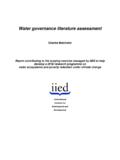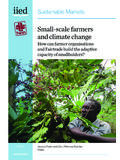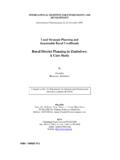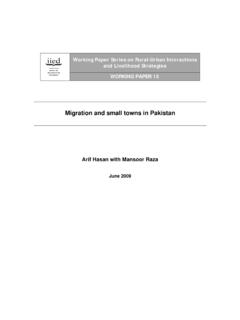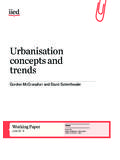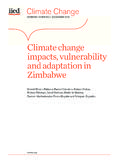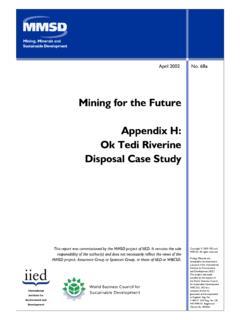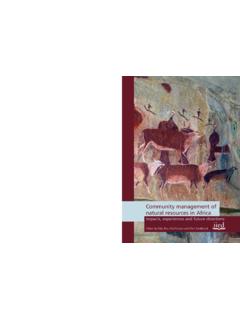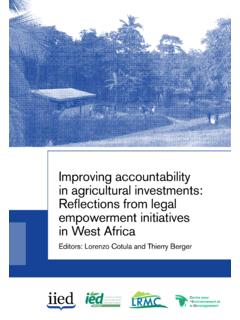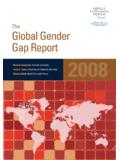Transcription of India’s peri-urban frontier: rural-urban transformations ...
1 India's peri-urban frontier : rural - urban transformations and food security Fiona Marshall and Pritpal Randhawa Working Paper urban ; Food and agriculture Keywords: March 2017 Food security, Urbanisation, rural - urban linkages, rural change, India About the author Acknowledgements Fiona Marshall, professor of environment and development, In this working paper, we bring together new analysis with insights Science Policy Research Unit, University of Sussex. from work done with colleagues and peri-urban communities in and Fiona India over the past two decades. This includes projects under the undertakes research and postgraduate teaching on environmental Social, Technological and Environmental Pathways to Sustainability change and food systems, science and technology policy in relation (STEPS) Centre (ES/I021620/1), supported by the Economic to the needs of the poor, the water-energy-food-environment and Social Research Council (ESRC) and the following projects nexus, and sustainable urban development in the global South.
2 Supported by the UK Department for International Development (DFID): Contaminated Irrigation Water and Food Safety for the Pritpal Randhawa, senior researcher, Jawaharlal Nehru University urban and peri-urban Poor (DFID Engineering Knowledge and (JNU), New Delhi. Trained in science policy studies, his work Research Programme); Enhancing Food Chain Integrity: Quality is focused on diverse aspects of sustainability including policy Assurance Mechanisms for Air Pollution Impacts on Fruit and process, governance, informality, local knowledge and everyday Vegetable Systems in India (DFID Crop Post Harvest Programme).
3 Environmentalism in the urban and peri-urban contexts. and Impacts and Policy Implications of Air Pollution Effects on Produced by IIED's Human Settlements urban and peri-urban Agriculture in India (DFID Environment Research Programme). In Section 4 we acknowledge associated Group ongoing work by our colleagues involved in the Integrating Peri- urban / urban Synergies into urban Development Planning for The Human Settlements Group works to reduce poverty and Enhanced Ecosystem Service Benefits (NE/L001292/1) project, improve health and housing conditions in the urban centres of supported by the Ecosystem Services for Poverty Alleviation Africa, Asia and Latin America.
4 It seeks to combine this with (ESPA) Programme. The authors would also like to thank Cecilia promoting good governance and more ecologically sustainable Tacoli for her valuable comments and support for this working patterns of urban development and rural - urban linkages. paper. The opinions expressed in this working paper are the Partner organisations responsibility of the authors. The International Fund for Agricultural Development (IFAD) invests in rural people, empowering them to reduce poverty, increase food security, improve nutrition and strengthen resilience. Since 1978, IFAD has provided about US$ billion in grants and low-interest loans to projects that have reached some 445 million people.
5 IFAD. is an international financial institution and a specialised United Nations agency based in Rome the UN's food and agriculture hub. Published by IIED, March 2017. Marshall, F and Randhawa, P (2017) India's peri-urban frontier : rural - urban transformations and food security. IIED, London. http://. ISBN 978-1-78431-381-4. Printed on recycled paper with vegetable-based inks. International Institute for Environment and Development 80-86 Gray's Inn Road, London WC1X 8NH, UK. Tel: +44 (0)20 3463 7399. Fax: +44 (0)20 3514 9055. @iied Download more publications at IIED is a charity registered in England, Charity and in Scotland, OSCR Reg and a company limited by guarantee registered in England IIED Working paper In India, peri-urban areas are too often neglected.
6 Many people live in poverty and face increasing marginalisation and food insecurity. Yet peri-urban agriculture could be a major contributor to poverty alleviation and food security. This working paper examines rural - urban transformations in India in relation to changes in food production, access, consumption, nutritional quality and safety. To improve health and nutrition, a more holistic, food security-based perspective is needed. Policy and planning must support those fragile communities engaged in peri-urban agriculture while protecting the environmental services on which they depend. It also discusses examples of specific policies and programmes and considers knowledge gaps, governance challenges and mechanisms that might help facilitate pro-poor food security developments on the ground.
7 3. India's peri-urban frontier : rural - urban transformations and food security Contents Summary 6. 1 Economic liberalisation and rural - urban transformation 8. Background 8. Impacts of liberalisation on the agricultural sector 9. Economic liberalisation and urban development policies 9. Patterns of urban growth and peri-urbanisation 10. 2 rural - urban transformation, food consumption and nutrition 12. Food consumption and nutritional data-collection processes and problems 12. Comparing food consumption and nutritional status of the urban and rural poor 14. 3 Government-led schemes to address food insecurity 17. Public Distribution System (PDS) 17.
8 Midday Meals (MDM) programme for school children 18. Other schemes to complement the PDS and MDM 18. National Food Security Act (NFSA) 19. 4 Transformative policies to bridge the rural - urban divide 21. Focus on multiple dimensions of food security 21. How can urban and peri-urban agriculture contribute to food security? 22. How does peri-urban environmental degradation impact on food security? 24. Key policy entry points for addressing food security 25. 5 Conclusions and recommendations 29. References 31. Abbreviations and acronyms 36. Related reading 37. 4 IIED Working paper List of boxes, tables and figures Box 1.
9 Critique of the Food Security Bill by the Right to Food Campaign 19. Figure 1. The role of peri-urban agriculture in food security 22. Figure 2. peri-urban vegetable production and related policy fields 27. Table 1. Description of different income groups (monthly per capita income in rupees) 13. Table 2. Average monthly per capita food expenditure by different income groups, 1993 94 and 2011 12 (%) 14. Table 3. Average calories, protein and fat intake per capita/day, rural and urban India, 1993 94 and 2011 12 15. Table 4. Calories, protein and fat intakes by different income groups, 1993 94 and 2011 12 16. Table 5.
10 Sources of produce sold at Azadpur Market (%) 24. 5. India's peri-urban frontier : rural - urban transformations and food security Summary In India, peri-urban areas are too often neglected. They are fraught with institutional ambiguity, unplanned growth, poor infrastructure and environmental degradation. Many people live in poverty and face increasing marginalisation and food insecurity. Yet peri-urban agriculture could be a major contributor to poverty alleviation and food security. In this working paper, we examine rural - urban status than their rural counterparts. In peri-urban areas transformations in India in relation to changes in food in particular, there is a high concentration of people living production, access, consumption, nutritional quality in poverty.
